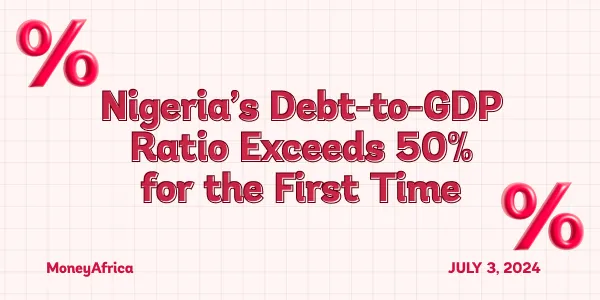Nigeria’s public debt has surged to an unprecedented N121 trillion. This debt comprises N65.6 trillion in domestic debt and $42.1 billion (approximately N56 trillion) in foreign debt. In December 2023, Nigeria’s GDP stood at N229.9 trillion in nominal terms.
Here’s a breakdown of recent GDP figures:
- Q2 2023: N52.1 trillion
- Q3 2023: N60.6 trillion
- Q4 2023: N65.9 trillion
- Q1 2024: N58.5 trillion
The trailing four-quarter GDP totals N237.5 trillion. Using the 2023 GDP, the debt-to-GDP ratio is 52.9%. When calculated with the trailing four-quarter GDP, the ratio is 51.2%.
Why this Matters?
Historically, Nigeria’s low debt-to-GDP ratio signalled economic resilience and the ability to borrow when necessary. Compared to its peers, Nigeria’s ratio is relatively moderate:
- Ghana: 84.9%
- South Africa: 72.2%
- Kenya: 70.1%
- Egypt: 95.8%
The pressing concern now is Nigeria’s high debt service-to-revenue ratio, which hampers its capacity to manage debt obligations. The rising debt-to-GDP ratio limits further borrowing options amid ongoing economic challenges.
Nigeria’s public debt has dramatically increased from N12.6 trillion in 2015 to N97.3 trillion in 2023. Between December 2023 and March 2024, the debt rose by N24.3 trillion. According to the Debt Management Office (DMO), this increase is due to new borrowing and naira devaluation. In Q1 2024 alone, fresh borrowing amounted to N7.71 trillion. This includes N6.06 trillion in domestic borrowing and the securitisation of Ways and Means Advances totalling N7.3 trillion.
“Ways and Means Advances” in Nigeria are short-term loans provided by the Central Bank of Nigeria (CBN) to the federal government to cover temporary budget deficits. These advances help the government manage immediate expenses when revenue collection is delayed. Typically, they must be repaid within the same fiscal year to avoid long-term debt issues. Recently, Nigeria has been converting some of these short-term loans into long-term debt instruments to better manage its financial obligations.
Why does the rising debt concern you?
Currency Depreciation:
High levels of public debt can erode investor confidence, leading to reduced foreign investment and capital flight. This can put downward pressure on the Naira, causing it to depreciate.
Inflation:
Depreciation of the Naira makes imports more expensive, contributing to inflation. Higher inflation can further weaken the currency as the cost of goods and services rises.
Monetary Policy Constraints:
The Central Bank of Nigeria (CBN) may face limitations in using monetary policy tools to stabilise the Naira. For instance, raising interest rates to defend the currency can stifle economic growth, while lowering rates to spur growth can exacerbate inflation and weaken the Naira further.
Debt Servicing Pressure:
Increased borrowing costs mean higher debt servicing payments, which can strain the national budget and limit funds available for essential public services and infrastructure projects. Currently, approximately N8.25 trillion of the national budget is allocated to debt servicing. A higher debt service ratio also means reduced borrowing opportunities for the private sector.
Higher Interest Rates:
This can make borrowing more expensive for people, making it harder for them to finance personal needs such as education, healthcare, or starting a business.
***
Would you like to know the state of your finances?
Take this test to see how you are doing financially
***
Do you know that we have our own podcast? It’s MONEYTALKS!💚
Here’s a link to listen to all the amazing episodes we have!
***
Thank you for reading Money Africa’s Blog.
Please feel free to share it.
Do you have any questions? You can send an e-mail to info@themoneyafrica.com or send a DM to any of our social media channels.
***
MoneyAfrica premium plan
Are you a mid to high-income earner? Do you find communities a bit too busy? You should sign up for our premium plan.

You can learn more about that here.
***
We often get questions regarding how to plan your finances to align with your relocation plans, especially for students seeking to further their studies. As always, we have heard you, and we have put together an e-book to help you navigate this. Follow this link, to get your FREE copy of the e-book: The Japa Encyclopedia.
***
Get our annual subscription and learn more about investing safely and building a solid portfolio in 2024.
Don’t forget to:
- Join our community, if you want to smash your 2024 financial goals. It takes at least 30 days to build great habits that will last you a lifetime. So why not start now? There is a lot you can achieve.
- If you would like to document your financial journey in 2024, then our journal would be an excellent fit for you. It costs ₦7,500 (excluding delivery).
- Get a budget sheet to track your monthly expenses. Click here
- Get an investment tracker to be on top of all your investments. Click here
MoneyAfrica is a financial literacy platform. Our goal is to make everyone better with their finances.
We do this by engagements via our:
– social media handles
– platforms for paid community members (for adults and students)
– webinar sessions with corporate clients
Would you like to join any of the communities? Please click here
Would you like us to hold a webinar for your company’s staff? Please send an email to info@themoneyafrica.com


